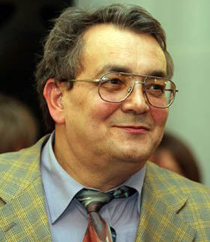
Yevhen Stankovych
Yevhen STANKOVYCH is one of the key figures in the contemporary musical culture of Eastern Europe. Since 1966, he has written 6 large symphonies, 10 chamber symphonies, a folk-opera (“When the Fern Blooms”), a chamber opera (“Opera Rustica”), 6 ballets, a large number of oratorical, chamber-vocal and instrumental pieces, as well as the music for 6 dramatic performances and over 100 movies. The composer was born on September 19, 1942 in the city of Svalyava in the Transcarpathian region of Ukraine. Like his Ukrainian born predecessor, Sergei Prokofiev, from his very first compositions, Stankovych established himself a composer of great dramatic talent. His refined technique, detailed polyphonic texture and universal lyricism evoke the style of the Baroque Period, while the full-blooded post-Romantic orchestration adds warmth and expression to his music. Stankovych’s creative works are extraordinary in their portrayal of emotional freedom, mastery of the subject matter, and in the versatility of form. Yevhen Stankovych has been awarded many honorary titles and awards, including “Hero of Ukraine”, the highest state award, as well as the highest awarded decoration for artistic activity – The Taras Shevchenko Ukrainian National Prize. In 1985, the organization UNESCO ranked his Third Chamber Symphony among the top ten compositions in the world. Stankovych’s compositions have been repeatedly performed in concert halls in Canada, the United States, Germany, France, England, the countries of former Yugoslavia, China, the Philippines, and in Eastern European countries. His compositions have been recorded in many countries by labels such as Melodiya, Analekta, AAV and Naxos. Prior to 1991 Yevhen Stankobych’s works were regularly censored or banned by Soviet authorities. The folk opera “When the Fern Blooms” was banned for its use of traditional Ukrainian folk melodies and their interpretation in a contemporary genre. The score, sets and costumes were destroyed by Soviet authorities. Excerpts from the work were first performed by the Winnipeg Symphony Orchestra in 1988. The ballet “Ol’ha” was repeatedly censored and was not performed in its original until after 1991. The ballet “The Agony: Rasputin” (originally titled “Prometheus”) was also severely censored; the work was first performed with its original music and libretto in 1989 in Skopje, Macedonia. The “Rasputin Suite” is now among his most performed orchestral works.
Titles:
- 2013 S511018 – Angel’s Touch
- 2015 R01631 – Chamber Symphony No. 12
- 2021 R01629 – Concerto for Four Horns and Strings
- 2021 X215001 – Concerto for Four Horns and Strings (soli and piano reduction)
- 2010 R01351 – Dictum 2: Chamber Symphony No. 10
- 2013 R01676 – Dnipro: A Symphonic Poem
- 1979/2023 R01643 – Elegy in Memory of Stanislav Liudkevych
- 2007 X503052 – Epilogues
- 1992 R01657 – Holodomor Requiem (for the Victims of the Great Famine)
- 2021 X521017 – Legend from the Mountains (Viola, Piano Reduction)
- 2021 R01630 – Legend from the Mountains for Viola and Strings
- 2004 X098003 – Liturgy of St. John Chrisostom (Chrysostom)
- 2014 X511059 – Maidan Fresco
- 2014 X662802 – Mirages
- 2021 X105025 – Music for Heaven Musicians
- 1990 R01682 – Night Before Christmas Suite, The
- 1972 X511060 – On Mountain Plains (In Verkhovyna).: Triptych for Violin and Piano
- 1985 R01528 – Rasputin: Suite from the Ballet
- 1971/2023 R01644 – Sinfonietta No. 1: In Modo Collage
- 2017/2023 X511057 – Sonata for Violin and Piano
- 1973 X504111 – String Quartet No. 1
- 1975/2023 R01649 – Symphony No. 2: Dramatic
- 2003 R01530 – Symphony No. 6
- R01636 – Ukrainian Poem for Solo Violin and Chamber Orchestra
- 2006 R01529 – Violin Concerto No. 2
- 2006 S511023 – Violin Concerto No. 2 (reduction)
- 2015 R01586 – Violin Concerto No. 3
- 2016 R01587 – Violin Concerto No. 4
- 2017 R01588 – Violin Concerto No. 5
